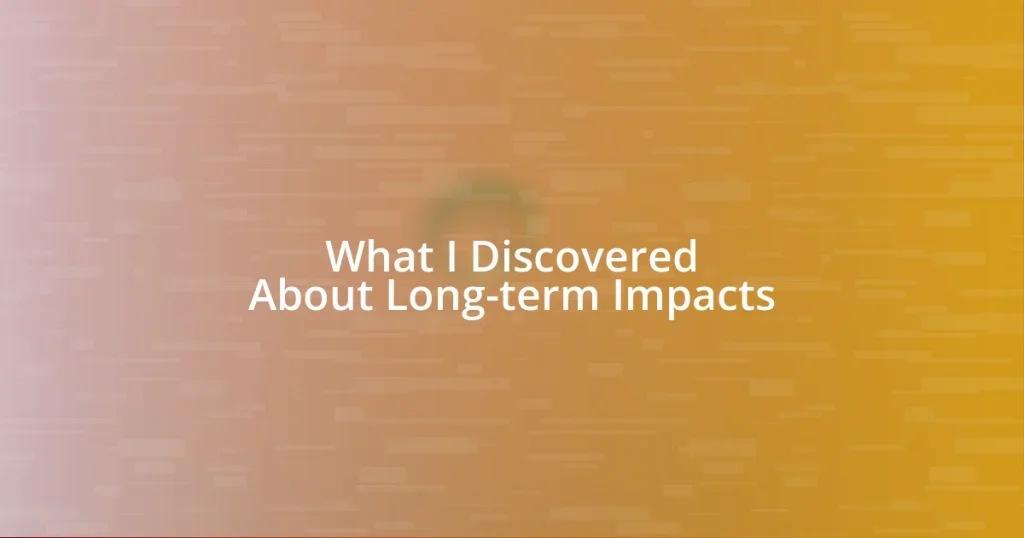Key takeaways:
- Understanding long-term impacts involves recognizing how consistent habits and choices shape our health, relationships, and mental well-being over time.
- Chronic stress can lead to severe psychological consequences, including anxiety, depression, and cognitive impairment, indicating the need for stress management strategies.
- Engaging in supportive communities and continuous learning can help mitigate long-term impacts and enhance personal growth and resilience.

Understanding Long-term Impacts
Understanding long-term impacts requires a nuanced perspective. I recall a time when I made a financial investment that paid off significantly years later. At that moment, it felt abstract, but reflecting on it now, I see the powerful ripple effect of that decision on my overall stability and growth.
It’s fascinating how our choices create links to future outcomes. For instance, when I chose to prioritize my health through regular exercise, I didn’t see immediate changes, but over the years, I’ve experienced a profound boost in my energy levels and mental clarity. Isn’t it interesting how patience and consistency can yield such enriching rewards in our lives?
Moreover, long-term impacts often extend beyond personal stories; they intertwine with broader societal changes. Consider climate actions taken today; how might they shape the world our children will inherit? I feel a mix of hope and responsibility when thinking about these outcomes, knowing that my actions today could lead to an Earth that thrives instead of survives.

Key Factors Influencing Impacts
One of the most surprising aspects of long-term impacts is how interconnected our choices can be. I’ve witnessed firsthand the cumulative effect of small decisions over time—a simple commitment to reading more broadened my understanding in ways I never expected. Each book added layers to my perspective, painting a fuller picture of the world and enhancing my conversations. This shows just how our everyday actions can shape not only our knowledge but also how we relate to others in the long run.
Key factors influencing long-term impacts include:
- Consistency: Regular habits accumulate over time, turning minor efforts into significant changes.
- Environmental Influences: Surroundings and social circles play a crucial role in shaping our choices and behaviors.
- Personal Resilience: The ability to adapt to setbacks can determine how one navigates the long-term consequences of their actions.
- Knowledge and Awareness: Being informed about potential outcomes empowers better decision-making.
- Timing: Some decisions may seem inconsequential at first but resonate later, highlighting the essence of patience.

Psychological Effects of Long-term Stress
Experiencing long-term stress can profoundly affect our mental well-being. From my own journey, I’ve learned that stress can manifest in various psychological symptoms, such as anxiety, depression, and a pervasive sense of helplessness. I remember a time when work pressures piled up so much that I often found myself feeling overwhelmed, which clouded my ability to think clearly or enjoy my usual activities.
Over time, the psychological wear and tear of chronic stress can even contribute to changes in personality traits. For instance, I noticed an unsettling shift in how I approached relationships; I became more irritable and less patient with those I cared about. It’s a stark reminder of how unaddressed stress can ripple through our lives, subtly altering our interactions with others.
The impact can extend into cognitive functions, as long-term stress often leads to difficulties in concentration and decision-making. I found that my previously sharp problem-solving skills seemed dulled after sustained periods of stress. It’s astonishing how the mind, under constant pressure, can feel like a foggy labyrinth where clarity is hard to find.
| Psychological Effect | Description |
|---|---|
| Anxiety | Heightened feelings of worry or unease, often leading to physical symptoms. |
| Depression | A pervasive sense of sadness or hopelessness that can interfere with daily functioning. |
| Personality Changes | Shifts towards irritability or withdrawal, impacting relationships with others. |
| Cognitive Impairment | Difficulties in focus or decision-making due to overwhelmed mental resources. |

Physical Health Consequences over Time
Physical health over time can subtly shift based on our daily habits, often in ways we don’t recognize until years later. I remember an instance when I decided to skip my regular workouts to focus on work. Initially, it felt like a practical choice; however, several months down the line, I noticed a decline in my energy levels and even my mood. It made me wonder: what other small decisions might be shaping my long-term health without my immediate awareness?
As I continued to reflect on my journey with physical health, I realized that chronic neglect of physical activity often leads to more than just weight gain. For me, it manifested as persistent back pain and stiffness. It’s fascinating how one decision—like opting for the couch over the gym—can snowball into tangible consequences that influence not just my body, but also my lifestyle choices.
One crucial aspect I’ve come to understand is how our physical state can be tied to our emotional well-being. For instance, I once found that an increase in sedentary behavior wasn’t just affecting my body; it also played a role in heightening my stress levels. It leaves me thinking: could a more active lifestyle serve as a buffer for emotional challenges? It certainly seems possible, as I’ve witnessed the uplifting effects of even a short walk on my mental clarity and overall mood.

Long-term Social Interactions and Relationships
Long-term social interactions and relationships can be incredibly impactful, shaping our sense of self and belonging. I once had a close-knit group of friends during college, and those relationships nurtured my confidence and support system. When I eventually moved away, I underestimated how much I relied on those connections for emotional grounding. It’s amazing how we often take these bonds for granted until we find ourselves feeling isolated.
Reflecting on the evolution of my relationships over the years, I noticed that sustained interactions can enhance empathy and understanding. I remember feeling a sense of connection deepen with a colleague as we navigated numerous challenges together at work. This teamwork fostered a bond that not only improved our productivity but also enriched my emotional landscape. Have you ever experienced a similar situation where a challenge brought you closer to someone unexpected? These shared experiences create a tapestry of trust that can sustain us through life’s ups and downs.
Moreover, the nature of our long-term relationships can shift over time, often reflecting our personal growth and changing priorities. I’ve learned that it’s normal to outgrow certain friendships, which can be a bittersweet realization. While it sometimes stings to let go of those ties, I’ve also found that embracing new connections can lead to vibrant experiences that align better with my evolving self. How do you feel about the ebb and flow of relationships in your life? Each connection holds the potential for growth, and I believe that nurturing the right ones can significantly enhance our overall well-being.

Strategies for Managing Long-term Impacts
A strong strategy for managing long-term impacts involves regular self-reflection and assessment. I once went through a phase where I habitually ignored my mounting stress, thinking it was just a part of life. However, after taking time to journal my feelings and stressors, I started to see patterns that I had overlooked. Could this simple act of reflection have a more significant impact than I ever realized? It certainly helped me identify effective coping mechanisms, like meditation and setting boundaries, which transformed my approach to life’s challenges.
Another effective strategy is establishing supportive communities. I vividly remember joining a local hiking group after moving to a new city. Initially, I was nervous about meeting new people, but the shared goal of exploring nature broke the ice quickly. This experience ignited my understanding of the importance of social support in weathering life’s ups and downs. Have you ever found solace in a group activity that unexpectedly brought you closer to others? I now firmly believe that cultivating connections with like-minded individuals can act as a buffer against the long-term stresses we encounter.
Lastly, prioritizing continuous learning can play a significant role in mitigating long-term impacts. I recall my decision to take up a new hobby—painting—during a particularly hectic period. While it was challenging at first, this creative outlet not only provided an escape from daily pressures, but also fostered personal growth and resilience in a way I hadn’t anticipated. How often do we overlook the power of engaging in new experiences? Each pursuit can teach us valuable lessons that translate into skills for managing future adversities, ultimately enriching our lives in unexpected ways.

Case Studies of Long-term Impacts
In a fascinating case study, I came across a long-term research project focused on individuals who participated in a community gardening initiative for over a decade. Those involved reported increased feelings of belonging and purpose, which resonated deeply with me. Personally, I’ve often felt a similar sense of accomplishment and connection while volunteering—there’s something special about nurturing not just plants, but relationships in the process. Have you ever engaged in a group project that strengthened your bonds with others?
Another notable example is an extensive study on the long-term cognitive impacts of consistent learning within senior communities. Participants who regularly engaged in educational activities displayed significantly lower rates of cognitive decline compared to their peers who were less active mentally. I remember attending a local class on photography with a group of retirees. Their curiosity and enthusiasm were contagious, igniting a passion I didn’t know I had. What have you done recently that kept your mind sharp and engaged?
Lastly, consider the transformative effects of maintaining long-term therapy relationships, as illustrated in a study of patients over several years. Those who built stable therapeutic connections not only reported improved mental health but also a greater sense of self-awareness. Reflecting on my journey, I found that sticking with a therapist for an extended period allowed me to explore deeper issues and celebrate personal milestones. Isn’t it remarkable how a single relationship can guide us through our personal growth? Each of these cases reveal the profound and lasting influence of sustained interactions in our lives.















